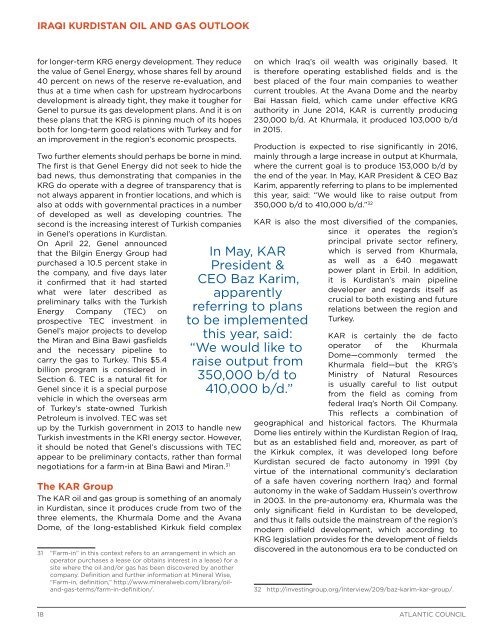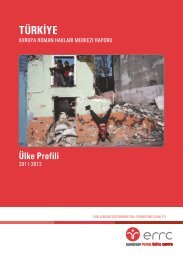Create successful ePaper yourself
Turn your PDF publications into a flip-book with our unique Google optimized e-Paper software.
<strong>IRAQI</strong> <strong>KURDISTAN</strong> <strong>OIL</strong> <strong>AND</strong> <strong>GAS</strong> <strong>OUTLOOK</strong><br />
for longer-term KRG energy development. They reduce<br />
the value of Genel Energy, whose shares fell by around<br />
40 percent on news of the reserve re-evaluation, and<br />
thus at a time when cash for upstream hydrocarbons<br />
development is already tight, they make it tougher for<br />
Genel to pursue its gas development plans. And it is on<br />
these plans that the KRG is pinning much of its hopes<br />
both for long-term good relations with Turkey and for<br />
an improvement in the region’s economic prospects.<br />
Two further elements should perhaps be borne in mind.<br />
The first is that Genel Energy did not seek to hide the<br />
bad news, thus demonstrating that companies in the<br />
KRG do operate with a degree of transparency that is<br />
not always apparent in frontier locations, and which is<br />
also at odds with governmental practices in a number<br />
of developed as well as developing countries. The<br />
second is the increasing interest of Turkish companies<br />
in Genel’s operations in Kurdistan.<br />
On April 22, Genel announced<br />
that the Bilgin Energy Group had<br />
purchased a 10.5 percent stake in<br />
the company, and five days later<br />
it confirmed that it had started<br />
what were later described as<br />
preliminary talks with the Turkish<br />
Energy Company (TEC) on<br />
prospective TEC investment in<br />
Genel’s major projects to develop<br />
the Miran and Bina Bawi gasfields<br />
and the necessary pipeline to<br />
carry the gas to Turkey. This $5.4<br />
billion program is considered in<br />
Section 6. TEC is a natural fit for<br />
Genel since it is a special purpose<br />
vehicle in which the overseas arm<br />
of Turkey’s state-owned Turkish<br />
Petroleum is involved. TEC was set<br />
up by the Turkish government in 2013 to handle new<br />
Turkish investments in the KRI energy sector. However,<br />
it should be noted that Genel’s discussions with TEC<br />
appear to be preliminary contacts, rather than formal<br />
negotiations for a farm-in at Bina Bawi and Miran. 31<br />
The KAR Group<br />
The KAR oil and gas group is something of an anomaly<br />
in Kurdistan, since it produces crude from two of the<br />
three elements, the Khurmala Dome and the Avana<br />
Dome, of the long-established Kirkuk field complex<br />
31 “Farm-in” in this context refers to an arrangement in which an<br />
operator purchases a lease (or obtains interest in a lease) for a<br />
site where the oil and/or gas has been discovered by another<br />
company. Definition and further information at Mineral Wise,<br />
“Farm-in, definition,” http://www.mineralweb.com/library/oiland-gas-terms/farm-in-definition/.<br />
In May, KAR<br />
President &<br />
CEO Baz Karim,<br />
apparently<br />
referring to plans<br />
to be implemented<br />
this year, said:<br />
“We would like to<br />
raise output from<br />
350,000 b/d to<br />
410,000 b/d.”<br />
on which Iraq’s oil wealth was originally based. It<br />
is therefore operating established fields and is the<br />
best placed of the four main companies to weather<br />
current troubles. At the Avana Dome and the nearby<br />
Bai Hassan field, which came under effective KRG<br />
authority in June 2014, KAR is currently producing<br />
230,000 b/d. At Khurmala, it produced 103,000 b/d<br />
in 2015.<br />
Production is expected to rise significantly in 2016,<br />
mainly through a large increase in output at Khurmala,<br />
where the current goal is to produce 153,000 b/d by<br />
the end of the year. In May, KAR President & CEO Baz<br />
Karim, apparently referring to plans to be implemented<br />
this year, said: “We would like to raise output from<br />
350,000 b/d to 410,000 b/d.” 32<br />
KAR is also the most diversified of the companies,<br />
since it operates the region’s<br />
principal private sector refinery,<br />
which is served from Khurmala,<br />
as well as a 640 megawatt<br />
power plant in Erbil. In addition,<br />
it is Kurdistan’s main pipeline<br />
developer and regards itself as<br />
crucial to both existing and future<br />
relations between the region and<br />
Turkey.<br />
KAR is certainly the de facto<br />
operator of the Khurmala<br />
Dome—commonly termed the<br />
Khurmala field—but the KRG’s<br />
Ministry of Natural Resources<br />
is usually careful to list output<br />
from the field as coming from<br />
federal Iraq’s North Oil Company.<br />
This reflects a combination of<br />
geographical and historical factors. The Khurmala<br />
Dome lies entirely within the Kurdistan Region of Iraq,<br />
but as an established field and, moreover, as part of<br />
the Kirkuk complex, it was developed long before<br />
Kurdistan secured de facto autonomy in 1991 (by<br />
virtue of the international community’s declaration<br />
of a safe haven covering northern Iraq) and formal<br />
autonomy in the wake of Saddam Hussein’s overthrow<br />
in 2003. In the pre-autonomy era, Khurmala was the<br />
only significant field in Kurdistan to be developed,<br />
and thus it falls outside the mainstream of the region’s<br />
modern oilfield development, which according to<br />
KRG legislation provides for the development of fields<br />
discovered in the autonomous era to be conducted on<br />
32 http://investingroup.org/interview/209/baz-karim-kar-group/.<br />
18 ATLANTIC COUNCIL



